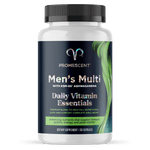Should you take a multivitamin? Learn about what multivitamins are, what science says about them, and the factors you should consider when deciding to take one.

reviews


reviews

Multivitamins have been popular for some time now. They’re pills filled with various nutrients designed to boost overall health.
They’ve become a convenient staple in many health regimens. But, do they live up to the hype? In answering that question, we’ll go over what the research shows and the importance of having a balanced diet.
If you're currently deficient in a specific nutrient, it may be ideal to take a multivitamin. Be sure to consult with a physician before starting a new supplement.
In general, there's no harm in taking a multivitamin everyday.
An excess of certain vitamins can potentially be harmful. Be sure to read labels to see how much of a specific nutrient you're getting, and consult with your physician to determine if it's too much.
We’ll also explain how individual health needs should factor in choosing whether to take a multivitamin.
Our aim is to provide clarity and evidence-based insights. Here’s what you need to know about multivitamins.
Multivitamins are more than just health supplements. They're a testament to the advances in nutritional science. But it’s important to have a full understanding of what they are.
Multivitamins are a blend of various vitamins and minerals, often tailored to address general health concerns or specific demographic needs. They are designed to supplement the diet, not replace it.
Common nutrients found in multivitamins include vitamins A, C, D, E, K, and B vitamins, as well as minerals like calcium, magnesium, and zinc.
The journey of multivitamins began in the early 20th century. With the discovery of vitamins and their role in preventing certain diseases, the concept of combining them into a single tablet emerged.
The widespread production and use of multivitamins started around the 1940s, coinciding with greater public awareness of nutrition's role in health.
Multivitamins come in various forms – tablets, capsules, powders, and even liquids. Each form has its unique absorption rates and efficacy.
A critical aspect of their composition is the balance of nutrients. For example, excessive amounts of certain vitamins or minerals can be harmful.
It's important to take time to understand the proper dosage of vitamins and minerals you need.
Studies on multivitamins show varied results. For example, some research suggests there’s insufficient evidence to support multivitamins' effectiveness in preventing cancer.
However, some studies indicate potential benefits in other areas of health. Research from Mass General Brigham found that older adults may see improvements in cognitive function with multivitamin use.
When it comes to preventing heart disease, multivitamins' efficacy varies. One study revealed no significant reduction in heart disease risk for multivitamin users.
However, another study found that long-term use of multivitamins by man was associated with a lower risk of major cardiovascular disease events.
This exploration into the science behind multivitamins reveals a complex picture. They might not be a cure-all, they can play a role in addressing specific health needs.
While multivitamins have been a subject of ongoing debate, there are a few established pros and cons of taking multivitamins. Knowing these benefits and drawbacks can help with deciding whether to take them or not.
Multivitamins can fill nutritional gaps, especially in diets lacking in certain vitamins and minerals. The National Institutes of Health highlights their role in supplementing dietary deficiencies, such as those lacking in nutrients like iron, vitamin b12, and vitamin D.
Certain groups might find multivitamins beneficial for specific health needs like anemia, neurological damage, and bone disease.
Excessive intake of certain vitamins and minerals can lead to adverse health effects. In particular, excessive intake of iron and calcium can be toxic.
Too much iron can cause chronic fatigue and depression, and excessive calcium can cause digestive issues and bone pain. Large doses of vitamin A, D, and E can also cause health issues.
Additionally, relying solely on multivitamins can lead to neglecting a balanced diet. Multivitamins are not meant to be substitutes for healthy eating.
When integrating multivitamins into a health regimen, it's essential to consider various factors to ensure their optimal use and effectiveness.
Different life stages and health conditions require specific nutrient profiles. For instance, some nutrients that older adults need include:
Calcium works with Vitamin D to help men have strong bones as they age. Vitamin B6 is needed for forming red blood cells, while Vitamin B12 helps keep red blood cells healthy.
It’s also important to take into account your current diet. Men who do not eat meat may lack the B vitamins they need for overall health.
Additionally, certain medications can deplete the body of specific nutrients. Diuretics reduce the supply of magnesium, potassium, and calcium in the body.
Proton pump inhibitors can prevent the absorption of Vitamin B12. Parkinson’s medications such as levodopa and carbidopa can also reduce the absorption of B vitamins.
One other important note to consider is whether you have a malabsorption condition. It can cause an increased risk of poor absorption of nutrients. Example conditions include:
To make the decision making process simpler, here are a list of statements to consider:
If any of the above statements apply to you, it would likely be beneficial to start taking a multivitamin.
Multivitamins have come a long way since they were first developed in the 1940s. As most research will point out, they are not magical pills that cure or prevent all ailments.
They are also not substitutes for a balanced diet. But multivitamins are beneficial in helping to fill nutritional gaps.
Individual needs vary, so it's crucial to choose multivitamins tailored to personal health requirements.
Consulting healthcare professionals for guidance on multivitamin use is always recommended.
In essence, multivitamins can be a part of a holistic approach to health. Remember, the key to a healthy life is a combination of a healthy diet, exercise, and mindful supplementation.
Our team has over a decade of experience in the sexual wellness field and are experts in sexual dysfunctions, like premature ejaculation. We help couples and individuals better understand treatment options available for different types of sexual needs and educate the public on all things related to intimacy. All of our authored content is medically reviewed for accuracy and reliability.
Absorption Pharmaceuticals LLC (Promescent) has strict informational citing guidelines and relies on peer-reviewed studies, academic or research institutions, medical associations, and medical experts. We attempt to use primary sources and refrain from using tertiary references and only citing trustworthy sources. Each article is reviewed, written, and updated by Medical Professionals or authoritative Experts in a specific, related field of practice. You can find out more about how we ensure our content is accurate and current by reading our editorial policy.
Semba RD. The discovery of the vitamins. Int J Vitam Nutr Res. 2012 Oct;82(5):310-5. doi: 10.1024/0300-9831/a000124. PMID: 23798048. Accessed on Feb, 1, 2024.
"Multivitamin mineral Supplements - National Institutes of Health." Ods.od.nih.gov, 2023, https://ods.od.nih.gov/factsheets/MVMS-HealthProfessional/. Accessed on Feb, 1, 2024.
Medical Examinations and Licensure. JAMA. 1937;109(22):1839–1840. doi:10.1001/jama.1937.02780480071029. Accessed on Feb, 1, 2024.
"Third Major Study Finds Evidence that Daily Multivitamin Supplements Improve Memory and Slow Cognitive Aging in Older Adults - Mass General Brigham." Massgeneralbrigham.org, 2024, https://www.massgeneralbrigham.org/en/about/newsroom/press-releases/multivitamins-improve-memory-and-slow-cognitive-aging. Accessed on Feb, 1, 2024.
"Are multivitamins good for you - Britsh Heart Foundation." Bhf.org.uk, 2024, https://www.bhf.org.uk/informationsupport/heart-matters-magazine/news/behind-the-headlines/multivitamins. Accessed on Feb, 1, 2024.
Rautiainen S, Rist PM, Glynn RJ, Buring JE, Gaziano JM, Sesso HD. Multivitamin Use and the Risk of Cardiovascular Disease in Men. J Nutr. 2016;146(6):1235-1240. doi:10.3945/jn.115.227884. Accessed on Feb, 1, 2024.
Ward E. Addressing nutritional gaps with multivitamin and mineral supplements. Nutr J. 2014;13:72. Published 2014 Jul 15. doi:10.1186/1475-2891-13-72. Accessed on Feb, 1, 2024.
McDowell LA, Kudaravalli P, Chen RJ, et al. Iron Overload. [Updated 2024 Jan 11]. In: StatPearls [Internet]. Treasure Island (FL): StatPearls Publishing; 2024 Jan-. Available from: https://www.ncbi.nlm.nih.gov/books/NBK526131/. Accessed on Feb, 1, 2024.
"Hypercalcemia - Penn Medicine." Pennmedicine.org, 2024, https://www.pennmedicine.org/for-patients-and-visitors/patient-information/conditions-treated-a-to-z/hypercalcemia. Accessed on Feb, 1, 2024.
"How Many Vitamins Can You Take a Day? - Health." Health.com, 2023, https://www.health.com/nutrition/too-many-vitamins. Accessed on Feb, 1, 2024.
"Health Check: can vitamins supplement a poor diet? - The Conversation." Theconversation.com, 2016, https://theconversation.com/health-check-can-vitamins-supplement-a-poor-diet-62291. Accessed on Feb, 1, 2024.
"Dietary Supplements for Older Adults - National Institute on Aging." Nia.nih.gov, 2021, https://www.nia.nih.gov/health/vitamins-and-supplements/dietary-supplements-older-adults. Accessed on Feb, 1, 2024.

reviews
Your Cart Is Empty